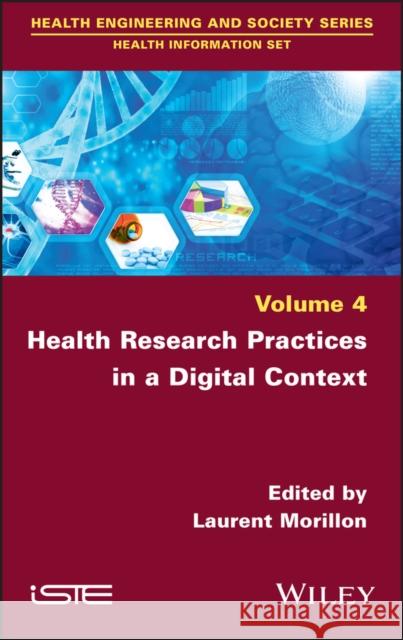Health Research Practices in a Digital Context » książka



Health Research Practices in a Digital Context
ISBN-13: 9781786304384 / Angielski / Twarda / 2020 / 208 str.
Health Research Practices in a Digital Context
ISBN-13: 9781786304384 / Angielski / Twarda / 2020 / 208 str.
(netto: 682,24 VAT: 5%)
Najniższa cena z 30 dni: 706,15
ok. 30 dni roboczych.
Darmowa dostawa!
Foreword xiIntroduction xiiiLaurent MORILLONPart 1. Changes in Contexts and Info-communication Practices Related to the Digital Environment in the Health Field 1Chapter 1. Health and Digital Technology: Reflexive Feedback on Some Works 3Hélène ROMEYER1.1. Introduction 31.2. Voluntary changes over the last 50 years 41.2.1. An old but partial political desire 51.2.2. Coexistence of two types of information: medical and health information 71.3. Significant issues 91.3.1. Economic and professional issues 91.3.2. A plethora of information 111.3.3. Attempts to control 131.4. New uses 141.4.1. Continued confidence in physicians 151.4.2. Beyond information: life stories and testimonies 161.5. Conclusion 191.6. References 19Chapter 2. Social and Digital Resources: The Hindered Information Practices of Cancer Patients 23Adrien DEFOSSEZ2.1. Introduction 232.2. Patients and information 242.3. Getting information from family and friends when suffering from cancer 262.3.1. Which relatives are likely to provide what kind of information? 262.3.2. Difficulty in asking people around you for information 282.4. Getting information on the Internet when you are sick with cancer 302.4.1. Widespread use for limited benefits 302.4.2. The health Internet: a misleading exposure 332.5. Conclusion 342.6. References 35Chapter 3. Health at the In-between of Computing and the Information and Communication Sciences 39Philippe MARRAST3.1. Introduction 393.2. The hospital, a field to observe 413.3. An abductive and iterative approach for an "in-between" positioning 443.4. A theoretical diversity to characterize complex organizations 473.5. Conclusion 493.6. References 50Chapter 4. Mental Health and Support for Disaster Victims. Info-communication Devices for Training Volunteer First-aid Workers in a Digital Environment 55Silvia Rosa SIGALES RUIZ, Erik DE SOIR, Claudia Veronica MARQUEZ GONZALEZ and Michèle CARIA4.1. Introduction 554.2. Studying manuals to train volunteer rescue workers in psycho-emotional support for disaster victims 564.3. Four analysis guides 574.3.1. Metadata for online documents 584.3.2. Pedagogical engineering of online textbooks 594.3.3. Mental health intervention protocols 614.3.4. Disaster management protocols 644.4. An info-communication device for online training in disaster response 664.5. Conclusion 684.6. Appendix 694.7. References 70Part 2. Thinking about the Ethics of Health Research in a Digital Context 75Chapter 5. Ethical Positions Arising from Research on Online Communities in the Health Sector 77Aurélie POURREZ, Elodie CRESPEL, Stéphane DJAHANCHAHI, Olivier GALIBERT and Benoît CORDELIER5.1. Introduction 775.2. Epistemology, deontology and ethical reflection 795.2.1. From the necessary scientific reflexivity to empirical and methodological scientific ethics 795.2.2. ICS and methodological and empirical ethics related to the study of NICTs 805.2.3. Empirical and methodological ethics 825.3. Empirical and methodological ethics in ICS and digital health 845.3.1. Collecting authorizations and approvals 845.3.2. Concealing or revealing oneself as a "researcher-observer"? 855.3.3. Protecting respondents 875.3.4. Protecting researchers in controversies and emotionally engaging research 885.4. Conclusion 895.5. References 91Chapter 6. Action Research at La Poste to Prevent the Psychosocial Risks Associated with Digital Acculturation 93Emilie BLANC6.1. Introduction 936.2. The relevance of action research to prevent psychosocial risks 946.3. What method in action research prevents psychosocial risks? 976.4. Action research for ethical questions 986.5. Conclusion 1006.6. References 101Part 3. Thinking Approaches to Health Research in a Digital Context 103Chapter 7. Interests and Limitations of Interdisciplinary Research in a Living Lab to Meet the Needs of Senior Citizens 105Elizabeth BOUGEOIS and Hélène GERMAIN7.1. Introduction 1057.2. Reconsidering a Living Lab study: the centrality of user-experts 1087.2.1. Senior citizens and new technologies in a controlled environment 1097.2.2. The second study or how to reconsider research practices 1107.3. When experts-users tell researchers where to look 1127.3.1. Use of human, technical and digital aids by respondents 1127.3.2. Projected uses: from voice command to "smart" robots 1147.4. Among researchers: postures linked to disciplinary backgrounds 1157.5. Conclusion 1177.6. References 119Chapter 8. For a Comprehensive Approach to the Info-communication Practices of Breast Cancer Prevention Stakeholders: A Reflection on Screening 123Dorsaf OMRANE and Pierre MIGNOT8.1. Introduction 1238.2. State of the art of organized screening, a complex prevention system 1258.2.1. Screening: device, issues and controversies 1258.2.2. Representation of screening: between confidence and mistrust 1288.3. Need to understand the field of screening: methodological framework 1298.3.1. Exploratory approach: quantitative reflection on screening 1308.3.2. Ethnographic survey and qualitative content analysis: a comprehensive approach to screening 1328.4. Conclusion 1358.5. References 136Chapter 9. Health Research on Immunization after 2016: The Need for a Plural Methodological Approach 141Mylène COSTES and Audrey ARNOULT9.1. Introduction 1419.2. An exploratory study that raises methodological questions 1439.2.1. Construction of research questions 1439.2.2. A test methodology with limitations 1449.2.3. Reflexivity on the concept of "axiological neutrality" 1459.2.4. Unexpected results that lead to (re)thinking the method deployed 1459.3. The use of lexicometry for the analysis of interviews on vaccine hesitation and opposition 1489.3.1. Expanded field and themes 1489.3.2. The potential contributions of the Iramuteq software to health research 1509.4. Conclusion 1529.5. References 153Chapter 10. Qualitative Research in Health, in Sign Language: Multimodality and Interculturality of Analytical Work 159Sophie DALLE-NAZEBI10.1. Introduction 15910.2. Topicality of methodological issues in SL research 16010.2.1. Context and issues in SL health research 16010.2.2. The communication dimension at the heart of research activities 16110.3. The communication challenges of interviews in SL 16210.3.1. Challenges of a fine work on what is said in SL 16310.3.2. Domesticating the camera, keeping your hand on the format of exchanges 16510.3.3. Interacting in SL: a repositioning of bodies and objects 16610.4. Exposing SL speech analysis in publications 16710.4.1. Sharing benchmarks, a professional vision 16710.4.2. Test of an example 16810.4.3. The communicational anchoring of reading 17210.5. Conclusion 17310.6. References 174Postface 177Laurent MORILLONList of Authors 181Index 183
Laurent Morillon is a Professor at the University of the French West Indies. He is a researcher at the LC2S (UMR 8053) laboratory and leads a group on organizational communication (https://org-co.fr). His work focuses on the epistemological practices and models of actors in an organization context.
1997-2026 DolnySlask.com Agencja Internetowa
KrainaKsiazek.PL - Księgarnia Internetowa









